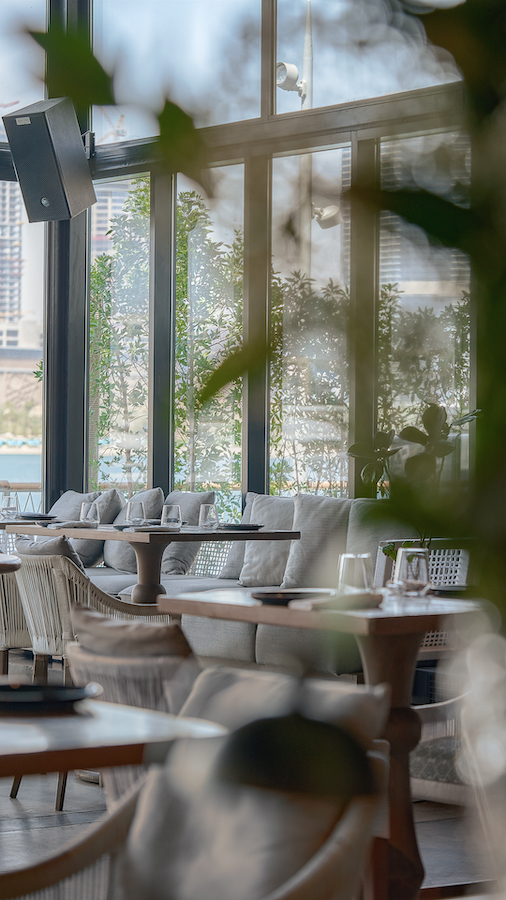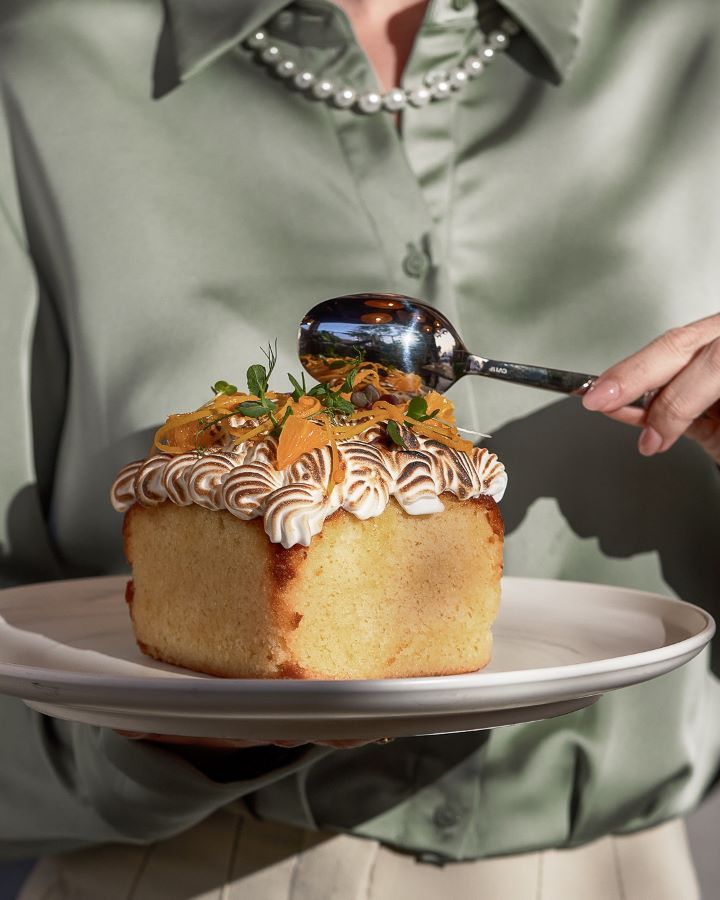DUBAI: Hadi Saroufim, executive chef at Dubai’s Beirut-import Bar Du Port, has been cooking since the age of 10, but he truly fell in love with the culinary world once he began training in professional kitchens.
“The more I worked in the industry, the more I loved it. I feel lucky to do what I do — it just feels right,” he tells Arab News.
“One of my earliest food memories is modernizing a traditional Lebanese dish, kibbeh, from my village, Zgharta, in Lebanon. I turned it into a kibbeh roll with ice-cream yogurt, cucumber jelly, and dry ice,” he says.

Bar Du Port. (Supplied)
His current favorite dish from the Bar Du Port menu is the grilled octopus with dried chorizo, tomato tartare, and smoky bell pepper coulis. “It uses simple ingredients but packs a punch,” he says. “This dish captures the essence of Mediterranean cuisine —fresh, bold, and delicious.”
Here, Saroufim discusses burned onions, annoying customer habits, and the magic of vinegar.
When you started out, what was the most common mistake you made?
I often burned onions and garlic during preparation. In a professional kitchen, even if you’re assigned to a specific section, you have to multitask and work under tight time constraints. The pressure to juggle various tasks simultaneously can be overwhelming, especially for a new chef. Balancing the preparation of different components while keeping an eye on cooking times and techniques is a skill that takes time to develop. Those early days were tough — but essential for learning how to manage everything.
What is your top tip for amateurs?
Always use the best fresh produce available. Quality ingredients can elevate a dish from ordinary to extraordinary. When you start with fresh, high-end produce, the natural flavors shine through. I’ve always admired how Chef Alain Ducasse emphasizes “naturalité” in his cuisine, focusing on the purity of ingredients and letting their natural qualities speak for themselves. This philosophy has influenced my approach as well. Whether you’re cooking a simple meal or an elaborate dish, the quality of your ingredients will always make a significant difference.

Thinly sliced yellowtail with burnt orange, passion fruit sauce. (Supplied)
What one ingredient can instantly improve any dish?
Vinegar, such as Xeres vinegar, instantly enhances any dish by adding a burst of flavor. Just a splash can elevate the dish and bring out its best qualities, making it a must-have in any kitchen. I particularly recommend it for risotto or salad dressing.
When you go out to eat, do you find yourself critiquing the food?
I definitely pay attention to the food, but I try not to be too critical. One thing I often notice is an overuse of sauces. While sauces can enhance a dish, too much can overpower the main produce and mask the natural flavors.
What’s your favorite cuisine?
I particularly enjoy French and Japanese cuisines. I also admire the craftsmanship behind quality beef dishes, like the carpaccio at Nobu, which inspires our own menu innovations.

Green lentil salad with rainbow cherry tomatoes, pomegranate, and yoghurt sumac dressing. (Supplied)
What customer behavior or request most annoys you?
I love innovating and being creative — it’s all part of the craft. For example, our avocado mash has a unique twist compared to a traditional guacamole recipe, and that once sparked a ‘friendly debate’ with a guest about its preparation. While I always value guest feedback, it can be annoying when customers insist on dishes matching their exact home recipes, leaving little room for creativity.
What’s your favorite dish to cook?
I’m passionate about cooking fish because of its delicate nature and the precision it demands. Getting the timing just right is crucial to preserve its freshness and flavors. One dish I particularly enjoy preparing is butterflied sea bass. I love how simple yet elegant it is — seasoned with lemon juice, olive oil, salt and pepper, and served with a refreshing courgette tartare. It’s a dish that showcases the beauty of fresh ingredients and allows me to express my creativity.

Burrata with kalamata olives, heirloom tomatoes, grilled zucchini, and basil pesto. (Supplied)
What’s the most difficult dish for you to get right?
One of the most challenging dishes for me is the traditional French foie-gras terrine — a classic of French cuisine. It demands meticulous technique, especially in layering the foie gras correctly. Precision is key; a slight misstep can cause the layers to blend together, compromising both the dish’s texture and presentation. Mastering the terrine requires careful attention to detail and a deep understanding of ingredients, making it technically demanding yet highly rewarding.
As a head chef, what are you like? Do you shout a lot? Or are you more laidback?
My focus is on maintaining calm and organization in the kitchen. On our busiest nights, we can serve up to 1,200 covers in our relatively small kitchen, so it’s important that everyone follows the rules. With a team of 15, discipline is crucial, but I avoid shouting, as it’s counterproductive.
Chef Hadi’s orange cake recipe

(Supplied)
INGREDIENTS
For the orange cake:
340g eggs; 470g sugar; 360g flour; 10g baking powder; 230ml whipping cream; 160g butter (melted); 70g orange juice; 7g orange zest
For the orange syrup:
60g orange juice; 30g water; 30g sugar
For the meringue:
3 egg whites (100g); 200g sugar
Additional:
50g orange
INSTRUCTIONS
(Note: A bain-marie is required)
For the orange cake:
1. Preheat oven to 160C.
2. In a mixing bowl, combine the sugar and orange zest. Add the eggs and beat well.
3. Add the orange juice and whipping cream. Mix thoroughly.
4. Sift in the flour and baking powder. Mix until there are no clumps.
5. Add the melted butter and mix well.
6. Pour the batter into a cake tray. Draw a straight line of melted butter on top.
7. Bake for 55 minutes.
8. Remove from the oven and pour the orange syrup over the cake. Allow it to cool.
For the orange syrup:
1. In a small saucepan, over very low heat, combine the orange juice, water, and sugar.
2. Bring to a simmer, stirring until the sugar is dissolved.
3. Remove from heat.
For the meringue:
1. In a bain-marie, heat the egg whites to 65C.
2. Transfer the egg whites to a mixer.
3. Gradually add the sugar while whisking until stiff peaks form.
Assembly:
1. Once the cake has cooled and absorbed the syrup, serve slices with a dollop of meringue and (optional) garnish with fresh orange slices and a scoop of orange ice cream.




















